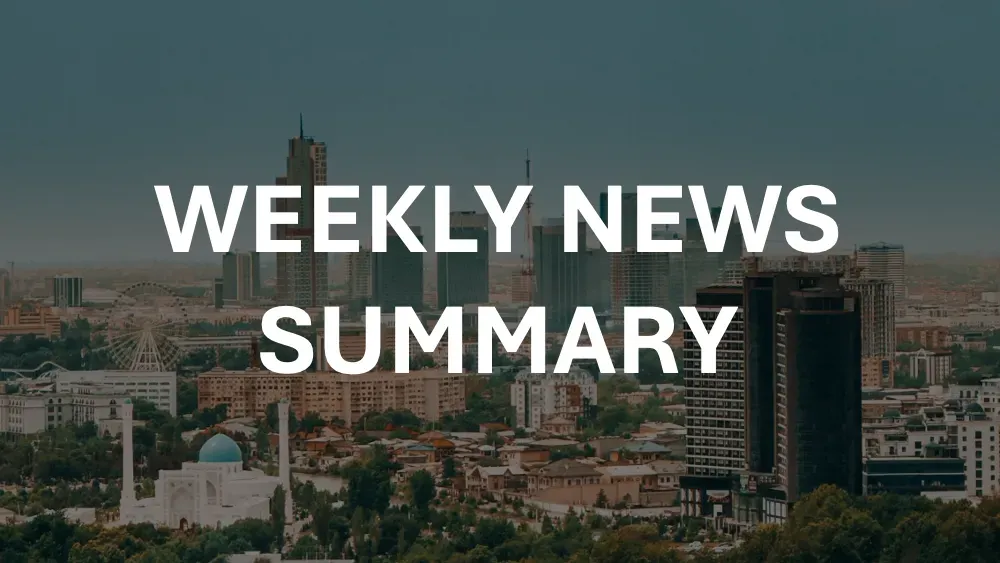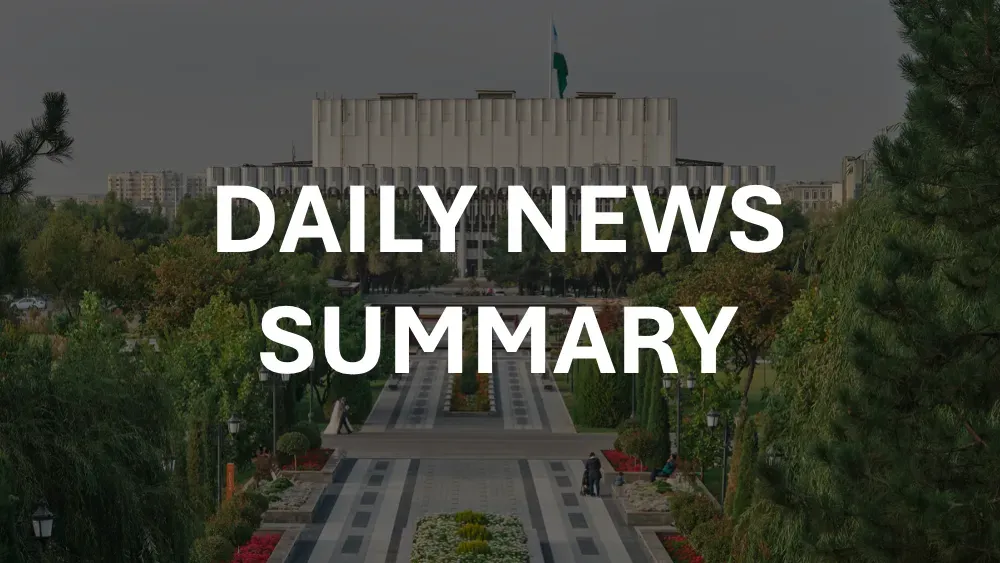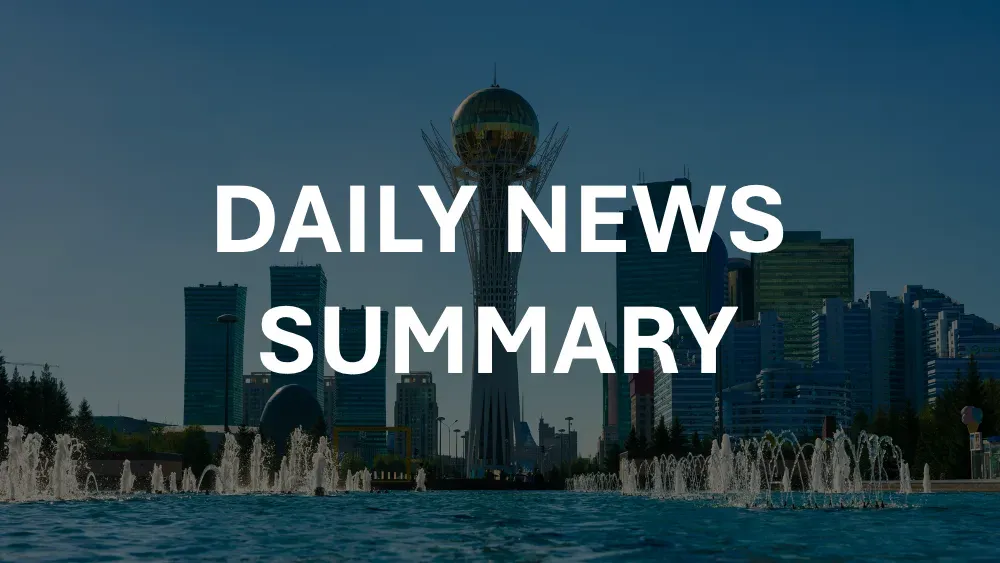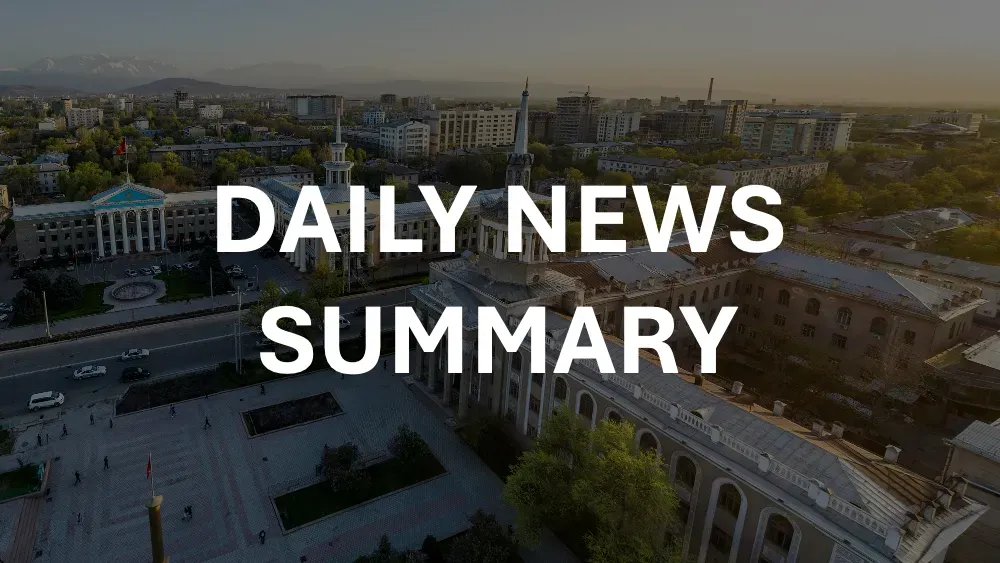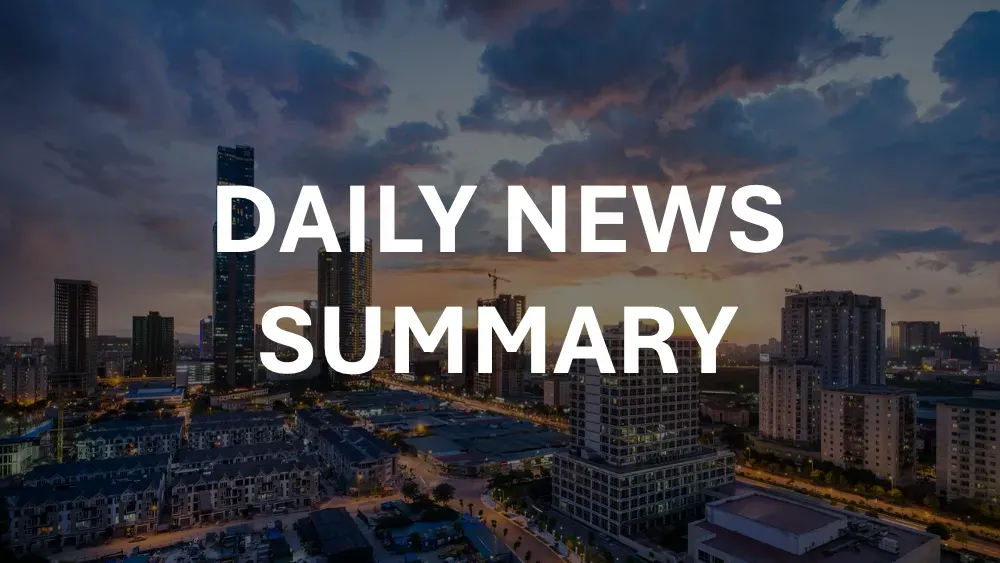This weekly digest showcases just 10 stories. Daily subscribers receive comprehensive intelligence briefs with 40 of the top stories organized by category. Don't miss the stories that matter.
Subscribe to Daily →
September 23, 2025 to September 29, 2025
This week's top 10 stories from Uzbekistan, selected from our daily intelligence briefs.
1. WTO Chief Signals Possible Membership Accession by March 2026 Following Negotiation Progress
WTO Director‑General Ngozi Okonjo‑Iweala said Uzbekistan’s accession process has “moved forward substantially” and could result in full membership by March 2026 if current momentum holds, though several negotiation tracks remain open. Okonjo‑Iweala and President Shavkat Mirziyoyev reviewed progress at the UNGA 80th session; a WTO Working Party meeting is scheduled for November as Tashkent aims to finalize talks by the 14th Ministerial Conference in 2026. Bilateral market‑access protocols have been signed with Argentina, Australia and Honduras, with a small number of partners—likely including Russia and the EU—still to conclude.
For international businesses and investors, accession would align Uzbekistan’s trade rules with WTO disciplines, likely improving market access, transparency and dispute‑resolution predictability while accelerating tariff and non‑tariff reform, customs modernization and services liberalization. The outlook implies an intensive 2025 to finalize schedules of commitments and domestic legislative harmonization needed for accession to take effect.
Local Coverage: kun.uz, uzdaily.uz, anhor.uz, uza.uz, gazeta.uz
From daily briefs: 2025-09-24, 2025-09-25, 2025-09-29
2. Energy Minister Cites $3–4 Billion Pipeline of U.S.-Backed Power Projects Following New York Meetings
Uzbekistan’s Energy Minister Jo‘rabek Mirzamahmudov said after meetings in New York that the country is pursuing a $3–4 billion pipeline of power-sector projects backed by U.S. capital and technology. The initiatives, aimed at accelerating the modernization and energy transition of Uzbekistan’s grid and generation assets, are being structured to attract faster execution and private‑sector participation, leveraging U.S. financial capacity and technical expertise.
For international investors and policymakers, the announcement signals intensified U.S.–Uzbek cooperation in energy infrastructure and a potential opening for U.S. financiers, equipment suppliers and developers to participate in procurement and project delivery. Mirzamahmudov framed the United States as a strategic partner for Uzbekistan’s transition, suggesting near‑term project rollouts that could reshape regional investment flows in Central Asian energy markets.
Local Coverage: kun.uz
From daily brief: 2025-09-29
3. Asaka Motors International and Rosatom Ink Deal to Localize EV Battery Production in Uzbekistan
Asaka Motors International and Rosatom’s fuel division (TVEL JSC) on 25 September signed a cooperation agreement at Moscow’s World Nuclear Week to develop localized lithium‑ion traction battery and stationary energy storage production in Uzbekistan. The partners will design a components localization program, determine assembly‑line capacity, identify potential customers and export routes to Central Asia and beyond, signaling a move to build regional supply chains for EV batteries and grid storage.
The deal leverages Rosatom’s fuel division experience — which supplies fuel to more than 70 power reactors across 15 countries and is diversifying into energy storage, chemicals, metallurgy, 3D printing and digital products — and Asaka Motors International’s (founded 2019) wholesale vehicle networks from the UAE, South Korea and China. For international professionals, the agreement indicates Uzbekistan’s push to develop domestic high‑tech manufacturing capacity and could reshape Central Asian export corridors for batteries and related components.
Local Coverage: gazeta.uz
From daily brief: 2025-09-27
4. Telecom Operators Cleared for Direct International Internet Access Following Market Liberalization Decision
On September 18, 2025 the Cabinet of Ministers approved Resolution No. 592 (effective September 19, 2025) launching a pilot that permits telecom operators with mobile and/or fixed networks to connect directly to international internet gateways for their own commercial traffic, provided they meet full information- and cybersecurity requirements. The measure implements Presidential Decree PF‑85 (June 3, 2024) and obliges participating operators to set up internet access centers, demonstrate nationwide infrastructure covering at least 50% of the population — including remote areas — via backbone fiber networks, and guarantee sufficient capacity for broadband services; project documentation must be filed with the Republican Center for Management of Uzbekistan’s Telecommunications Networks.
For international professionals, the decision signals a calibrated step toward market liberalization and competitive framework development in Uzbekistan’s telecom sector: it creates new commercial routing options for incumbent and alternative operators while preserving state oversight through technical, security and documentation requirements. The pilot’s infrastructure and coverage thresholds (≥50% population) and cybersecurity conditions will determine which players can enter cross‑border transit and how quickly international bandwidth markets and retail broadband competition might evolve.
Local Coverage: norma.uz
From daily brief: 2025-09-23
5. US–Uzbekistan Sign Memorandum to Expand Nuclear Energy Cooperation
The United States and Uzbekistan signed a memorandum of understanding on civilian nuclear cooperation, establishing a framework for expanded collaboration between specialists and industry; the MOU was signed in Tashkent by Uzbekistan’s Deputy Foreign Minister Muzaffarbek Madrahimov and U.S. Deputy Assistant Secretary for Arms Control and International Security Brent Christensen. Washington framed the agreement as part of expanding economic ties and investment opportunities in nuclear energy and critical minerals, dovetailing with Uzbekistan’s preparations for its first nuclear power plant and recent Uzbek Senate approval to join the Vienna Convention on civil liability for nuclear damage (enabling insurance and compensation mechanisms).
Separately, Uzbekistan’s Deputy Agriculture Minister Alisher Shukurov met Jason Hafemeister, Trade and Foreign Agricultural Affairs Advisor at the U.S. Department of Agriculture, to map next steps for bilateral agricultural cooperation aimed at boosting Uzbek agrifood exports to the U.S., launching joint projects, and transferring technology and quality standards. Both tracks signal clear opportunities for U.S.-Uzbek joint ventures, supply‑chain integration and agtech deployment, although no timelines or specific project lists were disclosed.
Local Coverage: gazeta.uz, uzdaily.uz
From daily briefs: 2025-09-23, 2025-09-27
6. NASDAQ to Support Overhaul of Tashkent Stock Exchange, Including Infrastructure for Government Bond Trading
President Shavkat Mirziyoyev met NASDAQ Chair Adena Friedman in New York to advance a partnership to modernize the Tashkent Stock Exchange and establish integrated infrastructure for government securities trading. The initiative would leverage NASDAQ’s technology and market-operator expertise (the operator oversees more than $30 trillion in assets) to align Uzbekistan’s exchange with global standards, improve transparency, liquidity and post‑trade efficiency, and broaden institutional access to local sovereign debt.
The move follows leadership changes at the exchange earlier in September and fits a wider government push to develop capital markets and diversify financing beyond banks. Korea Exchange already holds a 25% stake while the state asset agency owns 75%; cooperation with NASDAQ would introduce a second major international partner in governance and systems, potentially accelerating foreign participation in Uzbekistan’s debt markets.
Local Coverage: gazeta.uz, uza.uz, kun.uz, uzdaily.uz
From daily brief: 2025-09-24
7. Tashkent Deepens IMF Cooperation on Monetary, Fiscal Reforms as New York Talks Seal Training and Data Overhaul Support
Uzbekistan President Shavkat Mirziyoyev and IMF Managing Director Kristalina Georgieva met in New York to deepen IMF technical cooperation on monetary and fiscal policy, overhaul the national statistics system, and expand ongoing training for Uzbek economic agencies. The two sides reaffirmed regular collaboration on macroeconomic policy, budget and tax administration, and a jointly assessed financial-sector stability review completed this year that produced a reform “roadmap”; Georgieva publicly endorsed the government’s “irreversible” reform trajectory, signaling sustained IMF backing important for investor confidence.
The meetings also coincided with separate talks between Mirziyoyev and U.S. companies/financiers that yielded sectoral agreements in aviation, healthcare, mining, energy and AI/biotech, suggesting parallel momentum on investment facilitation as Tashkent institutionalizes reforms and aligns public finance and data systems with international standards.
Local Coverage: kun.uz, qalampir.uz, anhor.uz, uza.uz, gazeta.uz, uzdaily.uz
From daily briefs: 2025-09-23, 2025-09-24
8. EBRD Eyes New Financing for Infrastructure, Digitalization, and Water Management Projects
On 26 September, Uzbekistan’s Investment, Industry and Trade Ministry met with an EBRD delegation led by Managing Director for Sustainable Infrastructure Harry Boyd-Carpenter to discuss expanding the bank’s local engagement. The EBRD already manages a €5.8 billion portfolio in Uzbekistan across 185 projects; talks focused on scaling support in energy, transport, urban infrastructure, digitalization and water management, with both sides aligning on priority areas.
Participants signalled a strategic shift toward growing the non‑sovereign portfolio—notably through public‑private partnerships in socially significant sectors—and boosting grant funding for technical assistance, institutional development, digital upgrades and sustainable governance elements within investments. Although no timeline or project list was disclosed, the agenda points to continued EBRD involvement beyond sovereign lending, the potential to mobilize private capital into public services, and pressure to accelerate reforms in utilities and city services.
Local Coverage: uzdaily.uz
From daily brief: 2025-09-28
9. Global Finance Leaders Signal Deeper Engagement with Tashkent’s Capital Market and Sector Partnerships
During President Shavkat Mirziyoyev’s UN General Assembly visit in New York, Uzbekistan deepened ties with major U.S. and global financial and corporate players, signaling a concerted push to develop its capital markets and attract project finance. Senior executives from BNY (Katinka Valstrom) and Oppenheimer (Robert Loventhal) pledged expanded partnerships around capital‑market development and sectoral cooperation across supply chains, technology, energy, infrastructure and smart agriculture; Citigroup’s chair John Dugan confirmed Citi has been mandated to arrange Uzbekistan’s sovereign debt issuance, a move aimed at improving sovereign credit metrics and broadening investor access. The visit produced headline commercial deals — notably an agreement for Uzbekistan Airways to buy 22 Boeing 787s (14 firm, 8 options) worth about $8 billion — and a pipeline of signed or proposed projects and MOUs totaling roughly $100–105 billion across aviation, mining, finance, energy and infrastructure.
The engagements — including meetings with BlackRock/Global Infrastructure Partners, the World Bank, IMF Managing Director Kristalina Georgieva, Traxys ($1 billion mining pipeline) and prospective partnerships with NASDAQ, Franklin Templeton and others — underscore Tashkent’s strategy to leverage private and multilateral capital, lower borrowing costs via stronger ratings, and accelerate structural reforms (privatization, financial‑sector transformation, decarbonization, human‑capital initiatives). For international investors and policymakers, the outcomes point to growing market access opportunities and an elevated U.S.–Uzbek strategic economic relationship, while execution risks will hinge on reform implementation, rating trajectories and the timetables for sovereign issuance and project financing.
Local Coverage: uza.uz, kun.uz, qalampir.uz, anhor.uz, gazeta.uz, uzdaily.uz
From daily briefs: 2025-09-23, 2025-09-24, 2025-09-25, 2025-09-26, 2025-09-29, 2025-09-30
10. GSP+ Membership Drives 1.5x Growth in EU-Bound Finished Exports, Standards Overhaul Accelerates
Since joining the EU GSP+ scheme in 2021, Uzbekistan has sharply reoriented its textile sector toward higher-value finished goods: EU-bound finished exports are up 1.5x and textile exports reached $3.3 billion in 2024 as the country shifted away from raw cotton. Industry output doubled to $10 billion over eight years, now accounting for 14% of industrial production and 10.8% of exports, with finished-goods share rising from 27% in 2017 to 58% in 2024; knitwear and sewn products expanded 11.4-fold to more than 3.1 billion units. Authorities set 2026 targets of 146 trillion soums in output (9% growth) and $3.3 billion in exports, and from 1 September 2025 will apply a 1% social tax to textile and knitwear firms for three years alongside customs exemptions for listed mixed fabrics and inputs.
Regulatory and institutional reforms aim to underpin market access and WTO accession: about 4,500 international-aligned standards were adopted and ~4,000 outdated norms removed, 3,094 standards reviewed for WTO compliance, national technical committees expanded to 148 across 94 groups, and a digital TRIS system (tris.uz) with QR-coded certificates was launched. Cooperation with Germany’s PTB/DIN and Russia’s ASMS and a new Light Industry Development Agency (funding from 1 October 2025) complement debt-relief measures (principal-only payments from 1 August 2025, interest refunds for compliant payers) and producer subsidies—policies that increase attractiveness for foreign suppliers and investors while signalling a coordinated push to diversify markets and climb the value chain.
Local Coverage: uza.uz, uzdaily.uz, gazeta.uz, kun.uz
From daily briefs: 2025-09-23, 2025-09-24, 2025-09-26
About This Weekly Digest
The stories above represent the most significant developments from Uzbekistan this week, selected through our AI-powered analysis of hundreds of local news articles.
Stories are drawn from our daily intelligence briefs, which synthesize reporting from Uzbekistan's leading news sources to provide comprehensive situational awareness for international decision-makers.
These weekly highlights are a small sample of what's happening. Daily subscribers get comprehensive briefings with 40 top stories that connect the dots between events, track developing stories, and provide the context you need for informed decision-making.
Upgrade to Daily →
